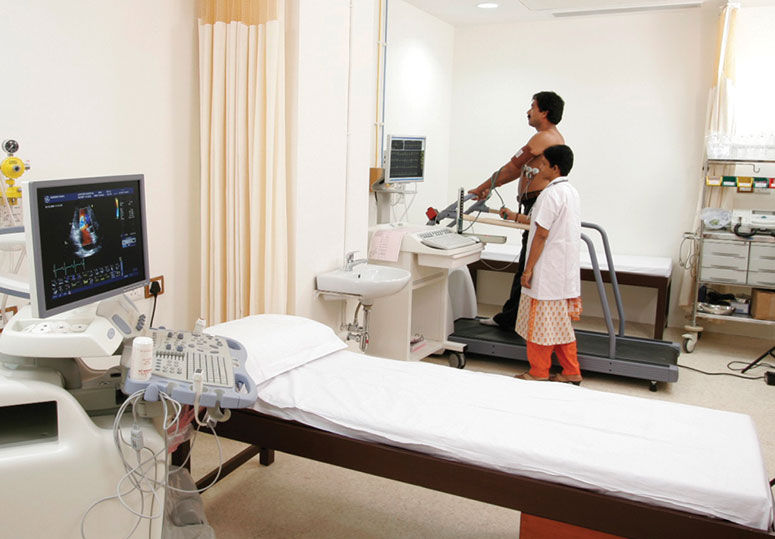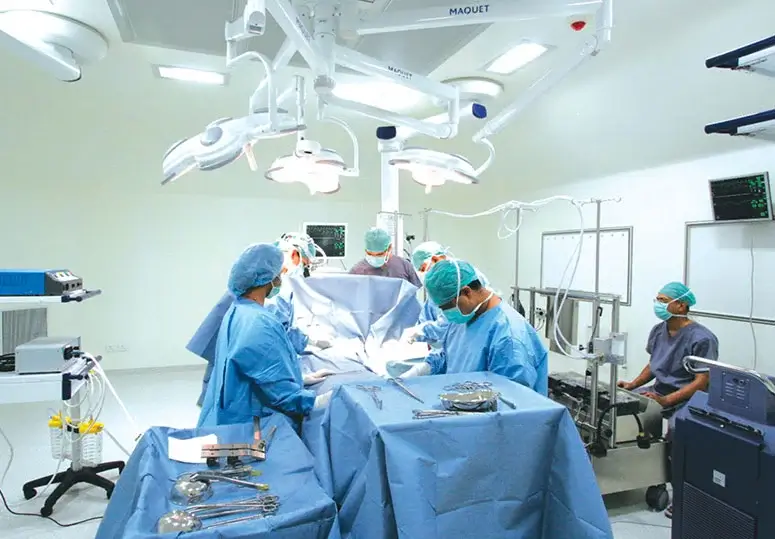Robotic Knee Replacement in Thane
Restoring Knee Pain Relief and Mobility with Robotics: A New Era of Knee Replacement
Jupiter Hospital houses a leading facility offering comprehensive robotic knee replacement treatment in Thane. Utilizing the second-generation CORI system, this innovative approach integrates 3D imaging guidance and robotic arms under the precise control of our skilled experts through a specialized console.
The procedure involves reconstruction using virtual patient anatomy, ensuring not only faster rehabilitation but also an optimal range of motion, allowing patients to seamlessly reintegrate into their daily routines. The benefits of robotic-assisted knee surgery are multifaceted, encompassing detailed surgical planning, enhanced precision, minimized incisions, increased ligament sparing options, precise implant fitting, improved positioning, and superior soft-tissue balancing.
The robotic precision is further complemented by the exceptional skills of our surgeons, maximizing the advantages for patients undergoing the operation.
In the initial stages, when patients with knee pain, swelling, and joint stiffness seek consultation in the Orthopaedic surgeon's OPD, our consultants assess the severity of the condition. Conservative treatments such as anti-inflammatory medications, weight management, cortisone shots, physical therapy, and knee braces may be recommended. However, if symptoms persist, joint replacement surgery is considered, preceded by diagnostic tests like X-rays and CT scans.
The surgical process, conducted by our well-trained joint replacement surgeons, is preceded by additional investigations such as laboratory tests. Patients typically stay in the hospital for 3 to 4 days, guided by the doctor's recommendations.
The post-operative rehabilitation process begins immediately or the following day, with patients encouraged to take small steps with support. Physiotherapists prescribe specific exercises to achieve a near-normal gait pattern and maximize range of motion. Continuation of exercises post-discharge is emphasized, with periodic follow-ups ensuring a comprehensive and effective recovery journey. Choose our robotic knee replacement hospital in Thane for a transformative experience in your treatment.
Team
Restoring Knee Pain Relief and Mobility with Robotics: A New Era of Knee Replacement
Jupiter Hospital houses a leading facility offering comprehensive robotic knee replacement treatment in Thane. Utilizing the second-generation CORI system, this innovative approach integrates 3D imaging guidance and robotic arms under the precise control of our skilled experts through a specialized console.
The procedure involves reconstruction using virtual patient anatomy, ensuring not only faster rehabilitation but also an optimal range of motion, allowing patients to seamlessly reintegrate into their daily routines. The benefits of robotic-assisted knee surgery are multifaceted, encompassing detailed surgical planning, enhanced precision, minimized incisions, increased ligament sparing options, precise implant fitting, improved positioning, and superior soft-tissue balancing.
The robotic precision is further complemented by the exceptional skills of our surgeons, maximizing the advantages for patients undergoing the operation.
In the initial stages, when patients with knee pain, swelling, and joint stiffness seek consultation in the Orthopaedic surgeon's OPD, our consultants assess the severity of the condition. Conservative treatments such as anti-inflammatory medications, weight management, cortisone shots, physical therapy, and knee braces may be recommended. However, if symptoms persist, joint replacement surgery is considered, preceded by diagnostic tests like X-rays and CT scans.
The surgical process, conducted by our well-trained joint replacement surgeons, is preceded by additional investigations such as laboratory tests. Patients typically stay in the hospital for 3 to 4 days, guided by the doctor's recommendations.
The post-operative rehabilitation process begins immediately or the following day, with patients encouraged to take small steps with support. Physiotherapists prescribe specific exercises to achieve a near-normal gait pattern and maximize range of motion. Continuation of exercises post-discharge is emphasized, with periodic follow-ups ensuring a comprehensive and effective recovery journey. Choose our robotic knee replacement hospital in Thane for a transformative experience in your treatment.
Looking for the Robotic Knee Replacement in Thane
Arthritis, characterized by joint swelling and tenderness, manifests through symptoms like joint pain, stiffness, and reduced range of motion, often worsening with age. The two most prevalent types are osteoarthritis and rheumatoid arthritis.
The management of arthritis focuses on pain control, minimizing joint damage, and enhancing or maintaining functionality and quality of life. Various medications and lifestyle adjustments contribute to achieving these goals, tailored to the severity of the condition, ranging from anti-inflammatory medications to Total Joint Replacement Surgeries.
Total/Unicondylar Knee Replacement is an orthopedic procedure restoring pain-free movement by replacing damaged knee joints with prosthetic components. Typically recommended for cases of severe joint damage where the joint is extensively worn out and is accompanied by progressive pain and diminished mobility, the procedure seeks to alleviate pain, enhance mobility, and restore overall function.
The success of knee replacement hinges on critical factors such as leg alignment, implant position, and fit. Modern implants that are currently available boast a lifespan of up to 30 years. For comprehensive arthritis management and advanced Total/Unicondylar Knee Replacement procedures, consider Jupiter Hospital, a renowned facility specializing in Robotic Knee Replacement treatment in Thane.
In joint replacement surgery, success depends on getting things just right—the implant, joint alignment, and balancing the ligaments. The robot shares details about the joint's shape, ligaments, and balance, helping pick the right-sized implant tailored to the joint. These steps ensure that the surgery is successful.
The robotic arm guides the surgery path accurately and stops if there's even a tiny detour. Before surgery, a CT scan plots a 3D model of the patient's knee. This helps surgeons place the implant exactly right. During surgery, the robotic arm uses this 3D model to help plot a safe path for surgeons, preventing harm to nearby tissue. This careful process ensures that robotic surgery achieves the needed alignment and balance, making the surgery accurate and predictable.
- Reduced Pain: Robotic-Assisted Surgery minimizes inflammation caused by foreign bodies, resulting in less pain and reduced reliance on painkillers. This approach keeps patients less medicated, contributing to a more alert feeling.
- Preservation of Native Bone: Utilizing a probe in Robotic arm-assisted surgery eliminates the need for saws or blades, minimizing blood loss and disturbance to the native bone. This preservation approach benefits the patient during the procedure.
- Swift Recovery: Smaller incisions and enhanced surgical precision in Robotic-Assisted surgeries lead to minimal bone and tissue disturbance, accelerating the body's natural healing process. This results in a faster recovery for the patient.
- Natural Feeling Post-Surgery: Robotic techniques enable the selection of implants based on the patient's specific anatomy, enhancing accuracy. A more precise implant placement contributes to a more natural feeling after surgery, reducing joint awareness during daily activities.
- No Additional Radiation Required: The Robotic arm, equipped with advanced software, provides image-free smart mapping, allowing real-time characterization of bone and cartilage without frequent preoperative imaging. This diminishes the need for exposing the patient to extra radiation, such as CT scans or X-rays before and after surgery, offering a hassle-free procedure for patients.
- Advancements in Unicondylar Knee Replacement: Traditionally, unicondylar knee replacements faced skepticism due to higher failure rates, often leading to total knee replacements. Robotic technology has improved the success and predictability of unicondylar knee replacement, instilling confidence in surgeons to offer this option to their patients.
Patients Speak
Hear the heartwarming stories of patients overcoming difficult afflictions
















 View Map
View Map Book an Appointment
Book an Appointment Find a Doctor
Find a Doctor Health Check-up
Health Check-up











 Find a Doctor
Find a Doctor Health Checkup
Health Checkup Book an Appointment
Book an Appointment